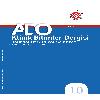Palm (Hurma) Yağı Atıklarının Pazarlanması: Nijerya'daki Ekonomik ve Çevresel Faydaları
Palm (Hurma) yağı endüstrisi, birçok insana geçim yolu sağlamaktadır ve böylece Nijerya ekonomisine büyük ölçüde katkıda bulunmaktadır. Palm yağının işlenmesi sonucu ortaya çıkan atıklar, genellikle çevresel tehlikelere yol açmaktadır. Günümüzde, sanayi atıklarının değerlendirilmesine yönelik araştırmalar, siyasi yaptırımlar ve tarımsal çevre düzenlemeleri için stratejik araştırmalar yapılmaktadır. Palm yağı işleyen işletmelerin ürettiği atıkların teknolojik ve ekonomik açıdan uygun, çevre dostu tekniklerle yönetilmesi önemlidir. Bu yüzden yapılan bu çalışmada, palm yağı atıklarının pazarlanmasında finansal ve çevresel faydalar araştırılmıştır. Birincil kaynaklardan toplanan atıkların değerlendirilmesine ilişkin veriler ve palm yağı atıklarının pazarlamasından elde edilen gelirler özel olarak hazırlanan anket kullanılarak belirlenmiştir. Anket çalışmasından elde edilen veriler, tanımlayıcı istatistiksel araçlar ve korelasyon analizi kullanılarak analiz edilmiştir. Çalışmanın sonuçları, palm yağı atıklarının büyük bir çoğunluğunu palm yağı posası (PPF) (%40) ve palm çekirdeği kabuğunun (% 32) oluşturduğunu göstermiştir. Atıkların değerlendirilmesinde geri dönüşüm (% 36 ) oldukça yaygındır, bunu satış (%30) yöntemleri izlemektedir. Palm yağı atıklarının organik geri dönüşümle atılması, çevre üzerinde (% 54) olumlu etkiye sahip olmuştur. Palm yağı işletmesi atık sularının satışı, işletme sahiplerine gelir getirdiği için, aralarındaki korelasyon istatistik açıdan önemli bulunmuştur (p <0.05). Bu çalışma göstermiştir ki, palm yağı atıklarının pazarlanması, palm yağı işletmelerinin gelirlerini arttırmış, ardından çevreyi olumlu yönde etkilemiştir. Nijerya'da palm yağı atıklarının pazarlanmasının geliştirilmesi tavsiye edilmiştir.
Anahtar Kelimeler:
finansal, çevresel faydalar, palm yağı, işleme atıkları
Marketing of Palm Oil Wastes: Economic and Environmental Benefits in Nigeria
The palm oil industry provides means of livelihood to many people thus contributing substantially to the Nigerian economy. Wastes generated from the processing of palm oil often constitute environmental hazards. At present, there is strategic search for research, policy debates and agro-environmental schemes geared toward the conversion of waste to wealth in the industry. It is important that the wastes generated by palm oil processors be managed using technologically sound, economically viable and environmentally friendly techniques. The study investigated the financial and environmental benefits in the marketing of palm oil wastes. Data on waste disposal methods and revenue derivable from the marketing of palm oil wastes were collected from primary sources using structured questionnaire. Data obtained from these sources were analyzed with the use of descriptive statistical tools and correlation analysis. The result showed that the major type of palm oil waste generated was palm press fibre (PPF) (40%) and palm kernel shell (32%). Recycling of waste (36%) dominated the waste management methods, followed by the sale (30%), while the least was dumping method. Disposal of palm oil waste through organic recycling had positive effect (54%) on the environment. The sale of palm oil mill effluent had significant (p<0.05) and positive relationship with revenue generated by palm oil processors. The marketing of palm oil waste studied enhanced the income of palm oil processors and improved environmental quality respectively. We recommended the development of the emerging market for palm oil wastes in Nigeria.
Keywords:
financial, environmental benefits, palm oil, processing wastes,
___
- Abdullah N, Sulaiman F (2013) The Oil Palm Wastes in Malaysia in Matovic, M. D.(ed.) Biomass now Sustainable Growth and Use, Intech Pub., pp.75-100. DOI: 10.5772/55302.
- Adeniyi OR, Ogunsola GO, Oluwusi D (2014) Methods of Palm Oil Processing in Ogun State, Nigeria: A Resource Use Efficiency Assessment. American International Journal of Contemporary Research, 4 (8):173-179.
- Armstrong R (1998) Palm oil, The Australian University, http://www.anu.edu.au/Forestry/wood/nwtp/palm/oil.html Accessed 17th July 2019.
- Ese P (2018) SWOT Analysis of Small Scale Palm Oil Extraction Firms in Ughelli North LGA of Delta State, Nigeria, (Unpublished B.Agric. Project work), Department of Agricultural Economics and Extension, Delta State University, Asaba Campus.
- Kei K, Mywish M, Ducan B (1997) Transformation versus stagnation in the oil palm Industry: A comparison between Malaysia and Nigeria. Staff Paper 97-5. Department of agricultural economics Michigan state university, East Lansing, Michigan 48824.
- MPOB (2016). Malaysian Oil Palm Statistics 2015.35th edn. Available online at www.mpob.gov.my › OPIEJ. Accessed 17th July 2019
- Omoti U (2004) Problems and prospects of oil palm development processing and potentials in Nigeria , paper presented at the Conference of African investment and development agency, On Attracting private foreign investment into Nigeria’s oil palm industry, at Kuala Lumpur, Dec 2004.
- Santoso AD (2018) Performance Evaluation of Palm Oil Mills in Renewable Energy Production, Jurnal Teknologi Lingkungan, 19 (2), 213 – 220.
- Srindhar MKC, Adeoluwa OO (2004) Palm oil industry residue, in Biotechnology for Agro industrial Residues utilization. P. Nigam and A. Pandey(eds), Springer the Netherlands. Usoro EJ (1974) The Nigeria oil palm industry, Ibadan: University of Ibadan Press.
- ISSN: 1304-7787
- Yayın Aralığı: Yılda 2 Sayı
- Başlangıç: 2004
- Yayıncı: Adnan Üniv. Ziraat Fak.
Sayıdaki Diğer Makaleler
Palm (Hurma) Yağı Atıklarının Pazarlanması: Nijerya'daki Ekonomik ve Çevresel Faydaları
Felix ACHOJA, Rosemary Ngozi OKOH, Comfort Ochuwa OSILAMA
Delta Sistemlerinde Peyzaj Deseni ve Mekansal Bağlantılılığın Analizi, Büyük Menderes Deltası Örneği
Ebru ERSOY TONYALOĞLU, Birsen KESGİN ATAK
Küresel Gıda Güvencesinin İzlenmesi ve Haritalanması Üzerine Bir Değerlendirme
Mustafa ÇELİK, Armağan TANRIKULU, Aslan ERSOY, Arif GÜNENÇ, Diren GÜNYÜZ
Uşak İlinden Seçilmiş Ceviz Genotiplerinde Meyvelerin Mineral Madde İçerikleri
Adem YAĞCI, Muhammet Esat ZENGİNOĞLU
Physicochemical Properties of Low-Fat Yoghurt with Whey Protein Isolates as Fat Alternative
